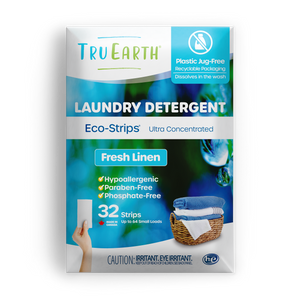Bleach is a household staple, renowned for its potent disinfecting properties. However, its fumes can raise concerns, especially in enclosed spaces. In this article, we will offer more information about bleach fumes, seeking answers to the question: How long do bleach fumes stay in the air?

The Chemistry of Bleach
Before we dive into the persistence of bleach fumes, it's crucial to comprehend the chemistry behind this powerful cleaning agent. Bleach primarily consists of sodium hypochlorite (NaClO), which, when mixed with water, undergoes a chemical reaction to produce hypochlorous acid (HOCl).
This acid is what gives bleach its disinfecting properties. When bleach comes into contact with organic matter like bacteria, viruses, or even organic residues on surfaces, it oxidizes and breaks them down, eliminating potential threats.
The Formation of Bleach Fumes
As bleach does its work, it emits fumes into the surrounding air. These fumes consist of chlorine gas (Cl2) and oxygen gas (O2), which are byproducts of the chemical reactions occurring in the bleach solution.
Chlorine gas, in particular, is notorious for its strong, pungent odor, which many associate with bleach. These fumes are what we often perceive as the distinctive smell of bleach.
Duration of Bleach Fumes in the Air
Now, let's address the pressing question: How long do bleach fumes linger in the air after you've used bleach for cleaning or disinfecting? The answer is somewhat complex, as it depends on various factors:
Ventilation
Adequate ventilation is pivotal in how long bleach fumes persist in the air. These fumes disperse rapidly in well-ventilated spaces and are less likely to accumulate. Conversely, bleach fumes can linger for an extended period in poorly ventilated areas.
Temperature
Temperature affects the rate at which bleach evaporates and releases fumes. Higher temperatures lead to faster evaporation and dispersal of fumes, while lower temperatures slow down this process.
Dilution
The bleach concentration in the cleaning solution also influences how long the fumes stay in the air. A more diluted bleach solution will produce fewer fumes and dissipate faster.
Surface Residues
If bleach comes into contact with surfaces that trap or absorb it, such as fabrics or porous materials, it can continue to release fumes as it gradually evaporates from these surfaces.
Indoor vs. Outdoor
The environment in which you use bleach matters. Outdoors, with its open space and abundant fresh air, bleach fumes disperse quickly. Indoors, however, proper ventilation becomes critical to minimize the duration of lingering fumes.
Human Sensitivity
Some individuals may be more sensitive to bleach fumes than others. Prolonged exposure to high concentrations of bleach fumes can cause respiratory irritation and discomfort.
Mitigating the Effects of Bleach Fumes
To ensure your safety and minimize the duration of bleach fumes in your indoor spaces, consider the following tips:
Ventilation
Open windows and doors to promote air circulation, especially when using bleach indoors. Fans can also help disperse fumes.
Dilution
Follow the manufacturer's instructions for diluting bleach to the appropriate concentration for your cleaning needs. Using too much bleach can lead to excessive fumes.
Safety Gear
When working with bleach for an extended period, wear appropriate personal protective equipment (PPE), such as gloves and a mask, to reduce inhalation exposure.
Timer
Set a timer to remind yourself to take breaks and step outside if you use bleach for an extended cleaning session.
Alternative Products
Explore alternative cleaning products that are less harsh and produce fewer fumes, especially if you or your household members are sensitive to bleach.
In conclusion, the duration of bleach fumes in the air varies based on several factors, including ventilation, temperature, and dilution.
Always use bleach in well-ventilated spaces to minimize exposure and discomfort, follow safety guidelines, and consider alternatives when appropriate. Understanding how bleach works, and its associated fumes empower you to use this cleaning agent effectively and safely.
Potential Health Effects of Prolonged Exposure
While bleach is an effective disinfectant, prolonged exposure to its fumes can have adverse health effects. It's important to recognize and address these concerns:
Respiratory Irritation
Chlorine gas, a component of bleach fumes, can irritate the respiratory system. Short-term exposure can lead to symptoms like coughing, wheezing, and shortness of breath. Individuals with asthma or other respiratory conditions may be more susceptible to these effects.
Eye and Skin Irritation
Contact with bleach fumes can cause eye and skin irritation. Red, watery eyes and skin redness or discomfort are common symptoms. Avoid direct contact with bleach and its fumes, and use protective gear when necessary.
Headaches and Nausea
Some people may experience headaches or nausea when exposed to bleach fumes for an extended period. Adequate ventilation and breaks can help alleviate these symptoms.
Asthma Exacerbation
Bleach fumes can trigger asthma attacks or worsen symptoms for individuals with asthma. Asthma patients must avoid unnecessary exposure to bleach.
Occupational Risks
Those working in professions frequently using bleach, such as cleaning or janitorial services, should be particularly cautious. Proper training and safety measures are essential to minimize risks.

Safeguarding Against Lasting Bleach Fumes
Understanding the dangers associated with inhaling lasting bleach fumes while cleaning the home is key for the safety and well-being of everyone in the household. Bleach, a potent disinfectant and cleaning agent, can release harmful chlorine gas and other toxic byproducts if not used and stored properly.
Prolonged exposure to these fumes can lead to various health issues, ranging from respiratory problems and skin irritation to more severe complications. Prioritizing safety protects your health and ensures that your home remains a clean and healthy environment for you and your loved ones.


